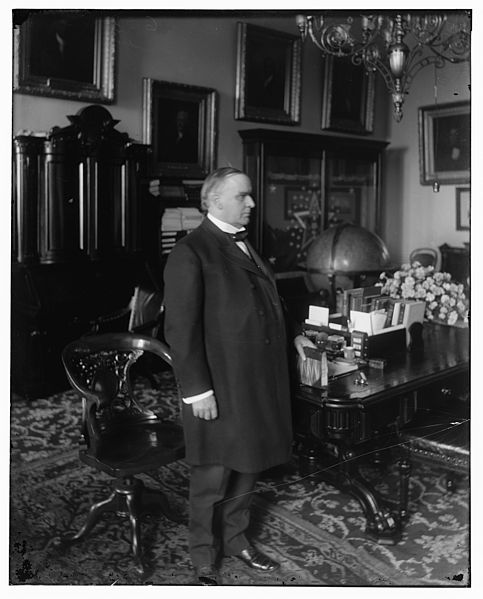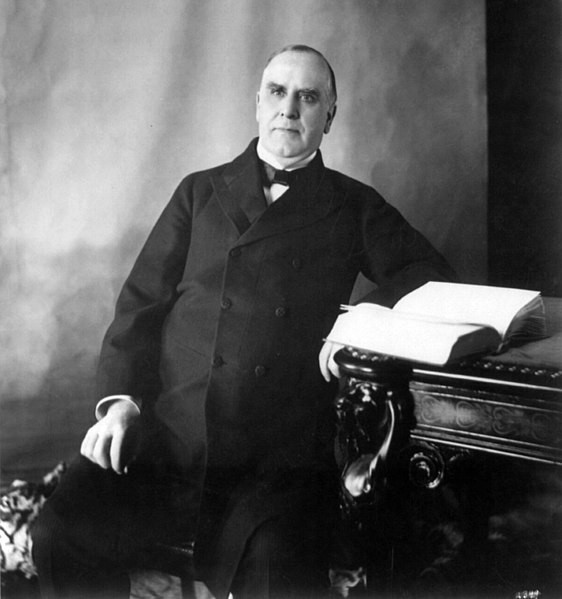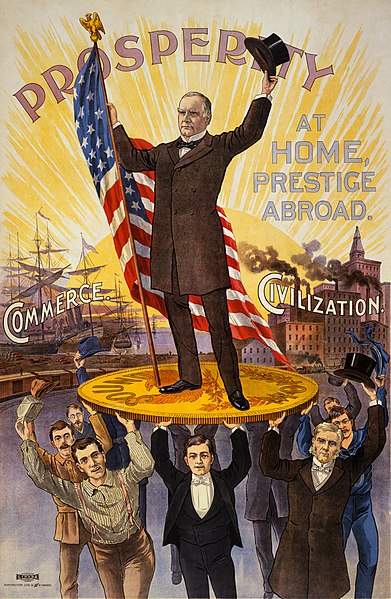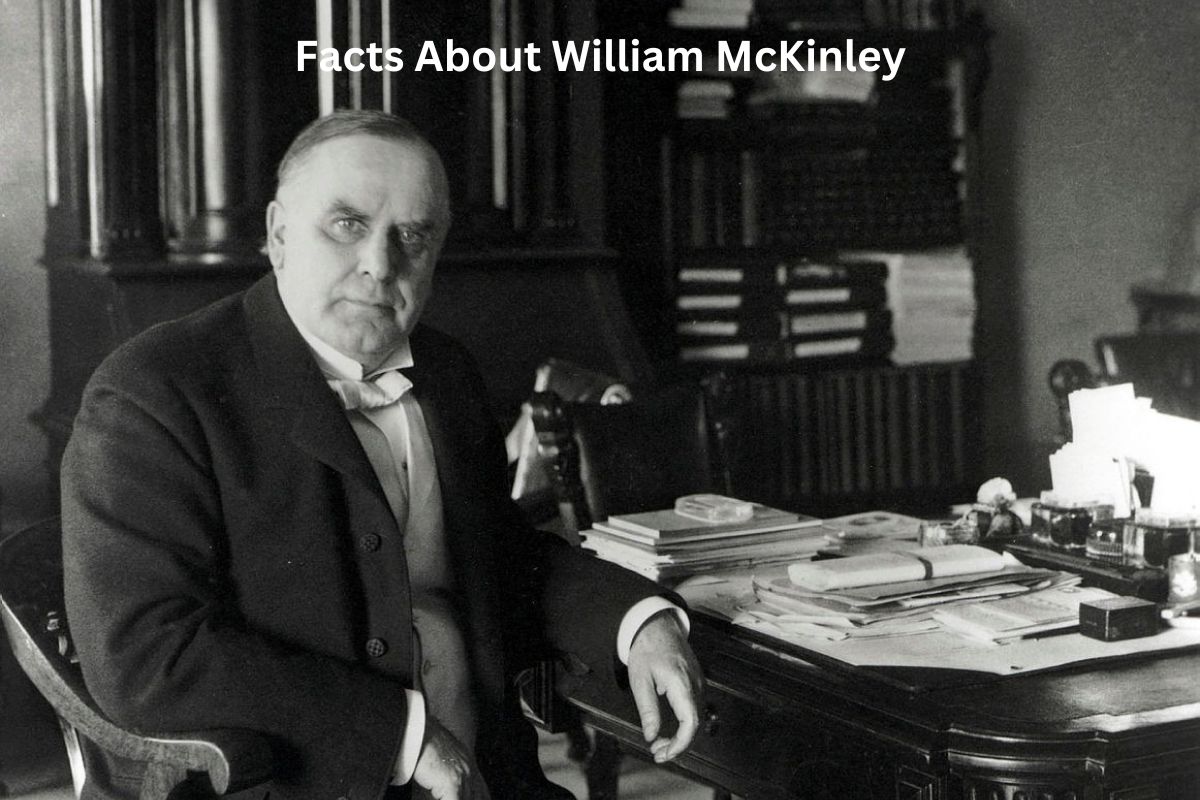William McKinley, the 25th President of the United States, lived a life of humble beginnings, marked by his early service in the Union Army during the Civil War and his subsequent career as a lawyer.
His political journey led him to the halls of Congress, where he championed protective tariffs and played a pivotal role in the passage of the McKinley Tariff Act of 1890.
As a two-term president, McKinley’s tenure was characterized by significant events such as the Spanish-American War, his tragic assassination, and a mixed legacy of economic prosperity and debates over American imperialism.
Additionally, he left a lasting mark by having the highest peak in North America, originally named Mount McKinley, now known as Denali.
William McKinley Facts
1. Born on January 29, 1843, in Niles, Ohio
William McKinley was born on January 29, 1843, in Niles, Ohio, a small town in northeastern Ohio. He was the seventh of nine children born to William and Nancy McKinley. The family lived in modest circumstances, and McKinley’s father worked as an iron foundry worker.
Despite his humble beginnings, McKinley would go on to become a prominent political figure in American history.

2. Served as a Union Army soldier during the Civil War
When the Civil War broke out in 1861, William McKinley was just 18 years old. He enlisted in the Union Army and joined the 23rd Ohio Infantry Regiment.
McKinley served primarily in the Western Theater of the war, participating in several significant battles, including Antietam and the Battle of Cloyd’s Mountain.
Also Read: William McKinley Accomplishments
His service was marked by courage and leadership, and he rose through the ranks, eventually earning the rank of brevet major.
His time in the military would have a profound impact on his later political career, as he gained valuable leadership experience and forged connections with influential figures like Rutherford B. Hayes.
3. Worked as a schoolteacher before becoming a lawyer
After the Civil War, McKinley returned to civilian life and embarked on a career in law. He studied law at Albany Law School in New York and then established a successful law practice in Canton, Ohio.
His legal career was prosperous, and he became known for his eloquence in the courtroom. This legal experience helped him build a strong reputation in his community and served as a stepping stone for his entry into politics.
4. Was a member of the U.S. House of Representatives
After establishing himself as a successful lawyer, William McKinley entered the world of politics. He served as a member of the United States House of Representatives from 1877 to 1883, representing Ohio’s 17th congressional district.
He then returned to Congress from 1885 to 1891, representing Ohio’s 18th congressional district. During his time in the House of Representatives, McKinley gained a reputation for being a staunch supporter of protective tariffs, which aimed to protect American industries from foreign competition. This stance on tariffs would become one of his defining political positions.

5. Advocated for protective tariffs
One of the most significant legislative accomplishments of McKinley’s early political career was his advocacy for the McKinley Tariff Act of 1890. As a key proponent of this legislation, he played a pivotal role in its passage.
The McKinley Tariff raised tariffs on imported goods, particularly manufactured products. It was a protectionist measure aimed at shielding American industries from foreign competition and was intended to stimulate economic growth and protect American jobs.
While it achieved some of these goals, it also faced criticism for contributing to higher consumer prices and economic tensions.
6. Elected as the 25th President of the United States in 1896
William McKinley ran for the presidency twice as the Republican candidate. In the 1896 presidential election, he faced off against Democrat William Jennings Bryan.
McKinley’s campaign focused on issues like protective tariffs, the gold standard, and sound money policies. He won the election with a substantial margin in both the popular and electoral votes.
McKinley’s second term came after his re-election in 1900, where he defeated William Jennings Bryan again. His second term was marked by international developments, including the Spanish-American War and the acquisition of overseas territories.

7. Led the country during the Spanish-American War in 1898
One of the most significant events during McKinley’s presidency was the outbreak of the Spanish-American War in 1898.
The conflict began as a result of tensions between the United States and Spain over issues such as Cuban independence and the explosion of the USS Maine in Havana Harbor. McKinley, initially cautious about entering the war, eventually asked Congress to authorize military intervention.
American forces, led by figures like Admiral George Dewey and General William Shafter, achieved several notable victories, including the naval battle of Manila Bay and the capture of Santiago de Cuba.
The war resulted in the Treaty of Paris, which concluded hostilities and led to the United States acquiring territories such as Puerto Rico, Guam, and the Philippines.
8. Assassinated on September 6, 1901, and died on September 14, 1901
Tragically, William McKinley’s presidency was cut short by an assassination attempt. On September 6, 1901, while attending the Pan-American Exposition in Buffalo, New York, McKinley was shot twice by an anarchist named Leon Czolgosz.
He was rushed to the hospital and initially seemed to be recovering, but his condition worsened due to an infection from the gunshot wounds. McKinley died on September 14, 1901, making him the third U.S. president to be assassinated, following Abraham Lincoln and James A. Garfield.
9. Legacy
William McKinley’s presidency left a lasting legacy. He presided over a period of economic prosperity known as the “McKinley Prosperity,” marked by industrial growth, low unemployment, and rising wages. His support for protective tariffs and the gold standard contributed to this economic stability.
Additionally, the acquisition of overseas territories as a result of the Spanish-American War expanded the United States’ global presence. However, his presidency is also remembered for controversies surrounding American imperialism and colonialism.
10. Mount McKinley in Alaska was named in his honor, though it’s now known as Denali
To honor President McKinley, the highest peak in North America, located in Alaska, was named Mount McKinley in 1896. However, the renaming of the mountain to Denali in 2015 marked a return to its traditional Athabaskan name. The change was seen as a recognition of the cultural and historical significance of the mountain to Alaska Natives and the state of Alaska.
